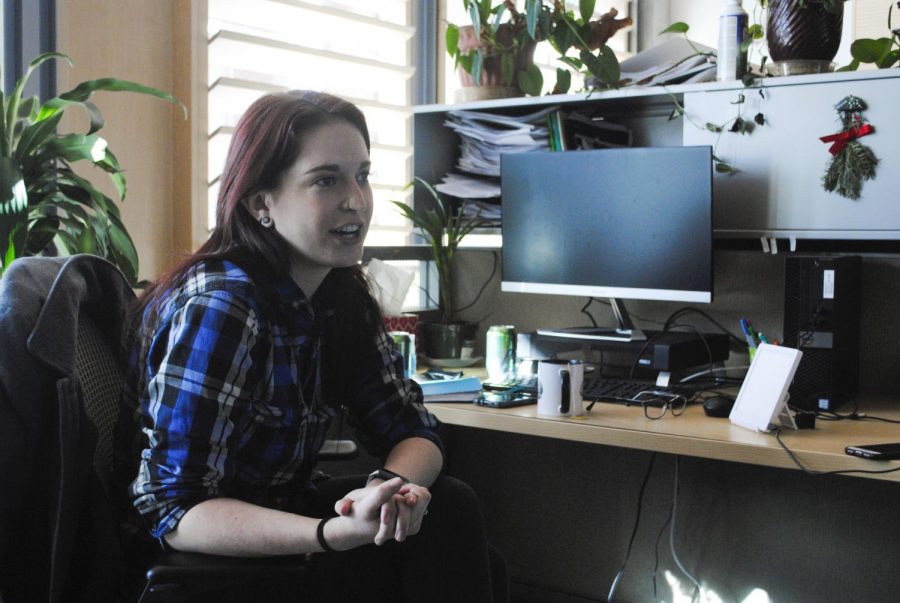Proposed laws may remove daylight saving time switch
Graduate researchers say hour-difference generally hurts health
ALYSSA STANFIELD | THE DAILY EVERGREEN
Naomi Wallace, neuroscience graduate student, explains how research shows negative effects of even a one-hour offset March 5 in the Veterinary and Biomedical Research Building.
March 18, 2019
Proposed bills in the Washington State Legislature involve the removal of the daylight saving time switch, as WSU researchers found that the hour switch negatively impacts sleep.
SB 5139, a Senate bill to make daylight saving time year-round, passed in the Senate, according to the Washington State Legislature website.
Research showed the change to and from daylight saving time twice per year inflicts negative effects. Some of these effects include increasing traffic accidents and disrupting agriculture scheduling, according to the bill.
HB 1196, a House bill that aims to do the same thing, passed in the House, according to the website.
Priyanka Bushana, graduate student in the WSU Sleep and Performance Research Center, said daylight saving time affects the circadian clock.
“The body is entirely synchronized by a master clock in the brain, called the suprachiasmatic nucleus, and when there are disruptions to that circadian functioning, the entire body can become desynchronized,” Bushana said.
This biological clock is synchronized to light and receives information from exposure to light, said Hans Van Dongen, director of the sleep and performance research center at WSU Spokane.
Naomi Wallace, a doctoral candidate in neuroscience, said this is the reason experts recommend that people do not look at their phones before going to bed.
Van Dongen said daylight saving time is like going to another time zone that is off by an hour.
“You might argue that a one-hour difference is not all that much, and you’d be right,” he said.
If people are already sleep-deprived or they are getting up earlier than their biological clock wants them to, they are already feeling fatigue, Van Dongen said.
The one-hour time difference brought on by daylight saving time will be felt more under these types of circumstances, he said.
Wallace said after the daylight saving time switch, people sleep for fewer hours, and the sleep they get is of lower quality. This causes an increase in traffic incidents the day after daylight saving time is implemented.
This also causes more workplace accidents, she said.
Bushana said as cognitive performance worsens after the daylight saving time switch, mood shifts are also more likely to occur. This includes an increase in suicide rates.
Wallace said the number of heart attacks also rises because changing time by an hour disrupts a person’s circadian rhythm. This rhythm can be disrupted by light exposure at an earlier time than normal, and heart attacks occur in the morning more often than any other time.
She said the effects of daylight saving time has not been studied comprehensively, so it is possible the switch has more serious effects.
Bushana said when they do research on animals, they do not actively collect data on days with daylight saving time switches.
“That would be akin to asking everyone to take the day off if we wanted to shift the clocks,” she said.
Bushana said the animals’ brains become desynchronized with the rest of their bodies, which can stress them out. Their organs need to become synchronized again with their brain.
Overall, Bushana said she thinks the negatives of daylight saving time outweigh any potential benefits.
She said the only benefit that might occur is less energy usage in states since the change causes more light in the evening. This change saves about one percent of energy in certain states, but people use more energy in other states because they have their air conditioners on for longer.
Wallace said she would prefer it if the state adopted year-round daylight saving time, but she would also support repealing it entirely.
“Any way we can get rid of the switch is going to be beneficial,” Wallace said.
It is a common misconception that daylight saving time helps farmers, she said. The practice in the U.S. started during World War I in 1918, and the country stayed on daylight saving time until 1919.
In World War II, the U.S. stayed on daylight saving time from 1942 until 1945, Wallace said. Since that time, it has been adopted in different states.
Van Dongen said he would like daylight saving time to be eliminated, but how that is implemented requires study.
Given where Spokane and Pullman are, he said, both should actually be in the Mountain Time Zone, not the Pacific Time Zone. That would give the Eastern part of Washington more light in the evening, but it is not convenient to have two time zones in the same state.
Van Dongen said people from puberty until their thirties would prefer more light in the evening. For the elderly and children, their biological clocks tell them to get up earlier, so they would not prefer that time shift as much, he said.
“The question of what’s the best choice … depends a lot on who you are,” he said. “There isn’t a single answer that would work for everybody.”

















